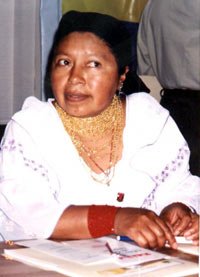


“Ecuador’s President is a Puppet of the World Bank”
Indigenous Leader Blanca Chancoso Takes on the U.S. Airbase in Ecuador and Other Impositions
By Alex Contreras Baspineiro
Special to The Narco News Bulletin
September 8, 2003
Publisher’s Note: Ecuadorian Indigenous Leader Blanca Chancoso is one of the 38 world leaders banned by the Mexican government from attending the World Trade Organization meeting in Cancun this week.Narco News Authentic Journalism Scholar Alex Contreras, of Bolivia, caught up with her in Venezuela last week, where this interview was conducted. It begins with a long summary, by Contreras, based on the interview and his reporting.
 Blanca Chancoso, indigenous representative from CONAIE D.R. 2003 Alex Contreras Baspineiro |
We spoke with Chancoso in the town of Quibor, in Venezuela. The leader explained that the indigenous-government rupture was based on the implementation and imposition of policies that were contrary to the battles in that country. Gutiérrez, in less than six months of governing, has become a “puppet” and a “servant” of the World Bank and the International Monetary Fund.
In an arbitary, arrogant, and dictatorial manner, the current Ecuadorian president signed a letter of intent to the IMF against the interests of the majority of the country’s inhabitants. This signature, that is worthless without the endorsement of his allies – among them, the indigenous vote that brought him to power – was produced only ten days after his inauguration, a time when previous regimes, historically, avoided doing so.
The IMF’s imposed policies raise the price of gas, privatizes some businesses, weakens worker protections, places the country in greater debt, marginalizes the basic needs of education and health, and turns Ecuadorian territory into part of the United States system of military bases.
From the beginning of his regime, the Ecuadorian president has acted arbitrarily. Last August 6th, due to North American impositions, the alliance of his Patriotic Society party with the CONAIE and the Pachakutik indigenous movement fell apart.
Every single cabinet member, vice minister, secretary and program director of indigenous roots resigned from the government simultaneously. From that moment, the Ecuadorian government tried to begin a campaign to divide and weaken the CONAIE. It couldn’t.
Indigenous Mandate
Prior to the rupture, on June 16th, Ecuador’s indigenous organizations presented a document to the president that outlined a program to redirect the government. The Mandate from the First Summit of Nationalities, Peoples, and Alternative Authorities, held in Quito, outlined various points that placed Gutiérrez virtually agains the wall: he would have to be with the people or against them.
In the economic area, the CONAIE demanded the immediate cancellation of the letter of intent Gutierrez signed to the IMF, the suspension of foreign debt payments until a full audit is completed, the cancellation of all privatization plans in strategic areas, the cancellation of the decree that raised gasoline prices, the restauration of worker protections and other demands.
In the political realm, the indigenous asked to convene a Constitutional Convention to reform the Political Constitution of the State, the restructuring of the Judicial Branch, a reduction in the number of members of Congress, the creation of election districts for indigenous communities, a frontal assault on corruption, and an immediate change in petroleum policies.
Among the agrarian policies proposed were the protection of national products, prohibiting the importation of agricultural or handmade products, land titles for indigenous communities, the establishment of a new price-setting policy for basic products, and establishment of programs to reactivate production by the small and medium-sized farmer.
In the area of social policy, they sought a budget increase to improve the quality of education, the implementation of bilingual and intercultural education, the suspension of the importation of various products, and greater value added to the production of small business, among others.
In international policy, they rejected Plan Colombia, demanded legal action against the United States government for the fumigations along the border with Colombia, the calling of a referendum vote on the proposed Free Trade Area of the Americas (FTAA), the revocation of the concession of the airbase at Manta to the U.S. government – and a ban on all future agreements of that kind – and the consolidation of a South American bloc to confront foreign debt.
Power from Below is Greater
Chancoso, of small stature but a big leader, said that Ecuador’s indigenous organizations will not ever allow themselves to become drunk with power, but will continue the dynamic of working with and from the local bases. “We don’t want power over the current State. Rather, we have the job of constructing local powers. Power that is born from below is stronger than that which Lucio has.”
Chancoso affirmed that, currently, Ecuador is in a “very fast-changing” situation, with a president who has no base of support, with the rightwing that tries to fill the power vacuum, and with the popular movements getting stronger.
“Lucio is falling only because he has no base left upon which to stand,” she said.
The indigenous leader said that now is not the time for demonstrations but if the government tries to impose an economic package, the indigenous peoples will not have any other alternative than to take to the streets, the roads, and the highways.
Lea Ud. el Artículo en Español
- The Fund for Authentic Journalism
For more Narco News, click here.




